To commemorate the second anniversary of the 2014 coup d’état, Prachatai presents interviews with some of those who had protested against the government and against elections, aka the PDRC, whose lives and political ideas have been changed under the junta. Branded as the ones who paved the way for the coup two years ago, they have now learned that it is better to have an elected government, even a ‘bad’ one, than a dictatorship.
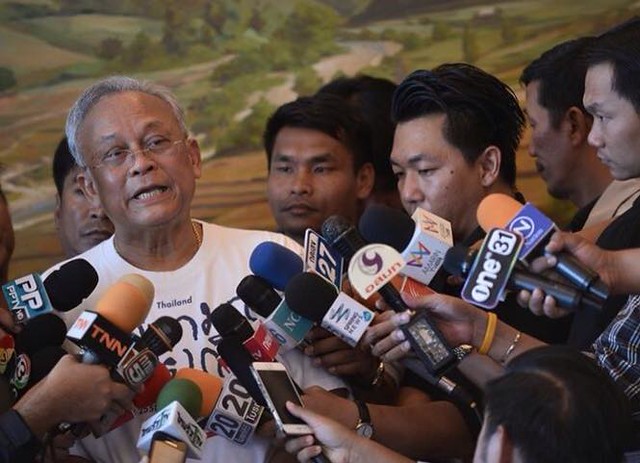
Suthep Thaugsuban tells the media on 14 April 2016 that he supports the draft charter
But that is only the PDRC leader’s opinion. The movement did not consist only of Democrat politicians, who seem to directly benefit from the junta’s attempts to weaken Thaksin’s Pheu Thai Party, but also activists and civil society workers from various fields, -- the environment, labour, health and development -- who have been greatly affected by the junta’s laws and policies.
In this article, four prominent civil society workers, who once sympathized with the PDRC, gave Prachatai their views of the junta’s administration in the past two years. Most importantly, they were asked “If you could go back in time, would you still join the PDRC?” Unlike Suthep, all four are very disappointed in Prayut and the coup.
Environmentalist: Junta favours capitalists more than Thaksin did
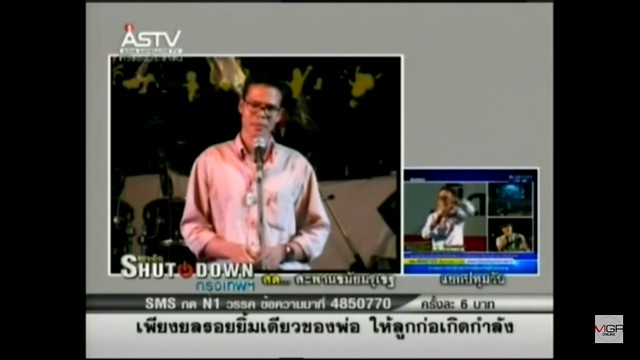
Prasitchai speaking on a PDRC stage on 20 February 2014 (source: ASTV Manager Online)
Prasitchai added that the junta’s policies and administration are no different from the Thaksin government. But the junta is much worse because people were able to stop some government projects during Thaksin’s time, but never under the junta.
“I previously thought that the military could make the country better and more developed but I’ve proved to myself that I was wrong,” Prasitchai said. “If I could turn back time, I wouldn’t participate in the movement (PDRC). This is not what I expected at all.”
Student activist: we want people’s participation in political reform
Unlike Prasitchai, Thatchapong Kaedam, a student activist who was very active in the student wing of the PDRC until the last minute, told Prachatai that if he could turn back time, he would join the movement anyway since he wanted to stop the Amnesty Bill. The fact that the Yingluck administration supported the blanket Amnesty Bill in 2013 to whitewash her own brother obviously showed that the government was a parliamentary dictatorship, which is unacceptable to Thatchapong.
“Democracy in the opinion of a vicious capitalist like Thaksin is not true democracy. But our democracy is the real thing because it emerges from the fact that you are sitting here [at the PDRC rally]. It is practical democracy,” Thatchapong said on the PDRC stage 2 years ago.
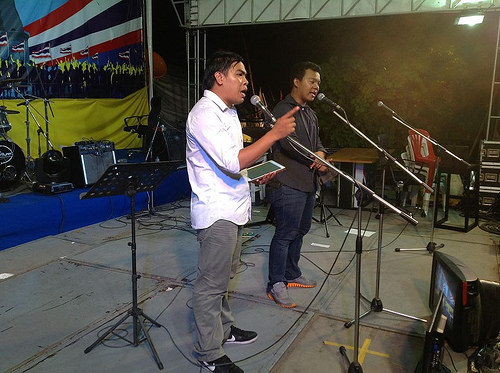
Thatchapong Kaedam (white shirt) speaking on a PDRC stage on 18 May 2014 (source: Lek Leko’s Facebook)
After observing the junta administration for two years, Thatchapong told Prachatai that he was disappointed because it has failed to deliver what it promised to the public – that it would reform the country before an election. According the draft charter, it is obvious that reform will happen after the election. Moreover, the reforms will be carried out by an unelected government and junta-appointed political bodies, not by the people or civil society.
“Back then, I always believed that a coup d’état would never happen again in this country. One had just happened in 2006 so I thought the military would not do it again. But of course, I was disappointed,” Thatchapong told Prachatai.
Thatchapong added that the junta’s intimidation of ordinary people will heat up political conflict. It is, however, not a conflict between the red shirts and the yellow shirts, but rather between the people and the dictatorial regime.
Doctor: we could protest under a civilian government, but now we can’t
The third interviewee is Supat Hasuwannakit, a medical doctor and activist from Energy Walk Thailand and the Medical Volunteer Network. He is also an official in the Ministry of Public Health. He had been part of PDRC movement since the anti-Amnesty Bill campaign and agreed with the anti-election strategy. Due to his involvement with various civil society organizations, he had proposed many issues, such as energy reform, community rights reform, healthcare reform, and bureaucratic reform, during the PDRC demonstrations.
“We don’t accept the election [on 2 February 2014] and the Constitutional Court has done the right thing by nullifying the election result,” Supat said on the PDRC main stage.
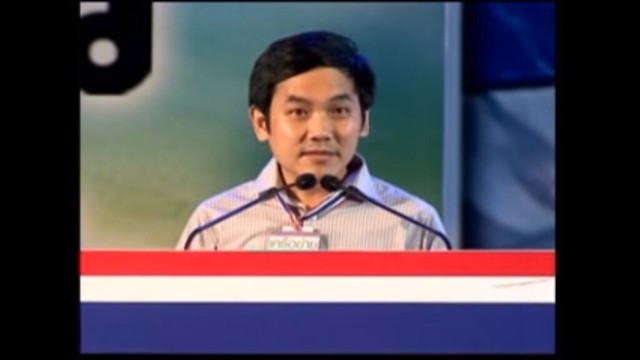
Supat Hasuwannakit on the PDRC main stage on 25 March 2014 (source: Bluesky Channel)
Two years later, Supat told Prachatai that people are now fed up with the junta but they don’t dare to express their anger due to the intensive suppression of free speech. This anger, however, will manifest itself in the August referendum, meaning that people show their approval or disapproval of the junta through the ballot box.
Supat added that generally, public assembly is how the people bargain with the state, but that is hardly possible under the junta.
“Let’s hold an election now. We’re sick of the junta. At least under an elected government, we can criticize, express ideas, and negotiate. Doing such things is very difficult under the junta,” said Supat. “This is a big lesson for all Thai people, that we might despair of representative democracy but a coup d’état is absolutely not an option in any way.”
Activist: We have a PM dumber than the previous one
Last but not least, Boonyuen Siritham, a former senator, is a former PDRC sympathizer whose networks have been affected by the junta. Like Supat, she is involved in various civil society issues such as community rights, consumer rights, and energy reform. However, during the PDRC movement, she mostly advocated energy reform, claiming that Thaksin had appointed his people to the boards of national energy agencies, making the price of energy higher than it should have been.
“To be an executive in the Thaksin regime, the first requirement is that you have to be dumb. You don’t have to think, just listen to Thaksin,” Boonyuen said on a PDRC stage.
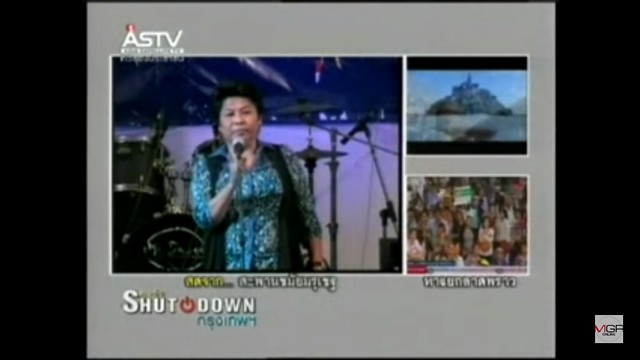
Read related story: Confessions of the 'whistle' anti-govt protesters (2013)

